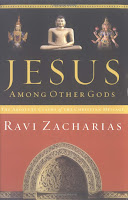
Last Sunday Pastor Allen held up the front page of the Arizona Daily Star on which this photo appeared. A group of skeptics purchased this bulletin board to tout their unbelief. Ironically, it replaced a bulletin board previously sponsored by a Christian group. For the whole story, you can go here.
One of the problems with such assertions (we can be good without God) is that when one denies the existence of a transcedent, over-arching authority, there is no means left by which to define that which is "good." Philosophers have struggled with this over the ages. Epicurus, Hobbes, Rousseau, Mill, and others who hated the notion of God, usually defined good as that which is "pleasurable, desirable, natural, expedient," and so on. The two problems with this are: (1) this is personal and subjective, not universal and objective; (2) what happens when my notion of "desirable" conflicts with someone else's?
C. S. Lewis dealt with this in the first chapter of Mere Christianity, when he pointed out that everyone seems to have this inbred notion of what is "fair," but non-theists want to pretend that they made this up by themselves. What they can't answer is the question, "Does good exist at all?" And if so, then by what standard is it determined? And (most importantly) where did this notion even come from?
Atheists such a Christopher Hitchins try to dodge this question by referring to "commonly held societal defintions" of good and evil. But this neither accounts for differences between what some cultures accept and others don't, or for why there are some notions that are abhorrent to all cultures. As for understanding the latter, we as Christians may refer to Romans 1:
17For therein is the righteousness of God revealed from faith to faith: as it is written, The just shall live by faith.
18For the wrath of God is revealed from heaven against all ungodliness and unrighteousness of men, who hold the truth in unrighteousness;
19Because that which may be known of God is manifest in them; for God hath shewed it unto them.
20For the invisible things of him from the creation of the world are clearly seen, being understood by the things that are made, even his eternal power and Godhead; so that they are without excuse:
,
"Without excuse" is a scary place to be if one thinks one can be good without God, and then falls short in even the slightest degree.









